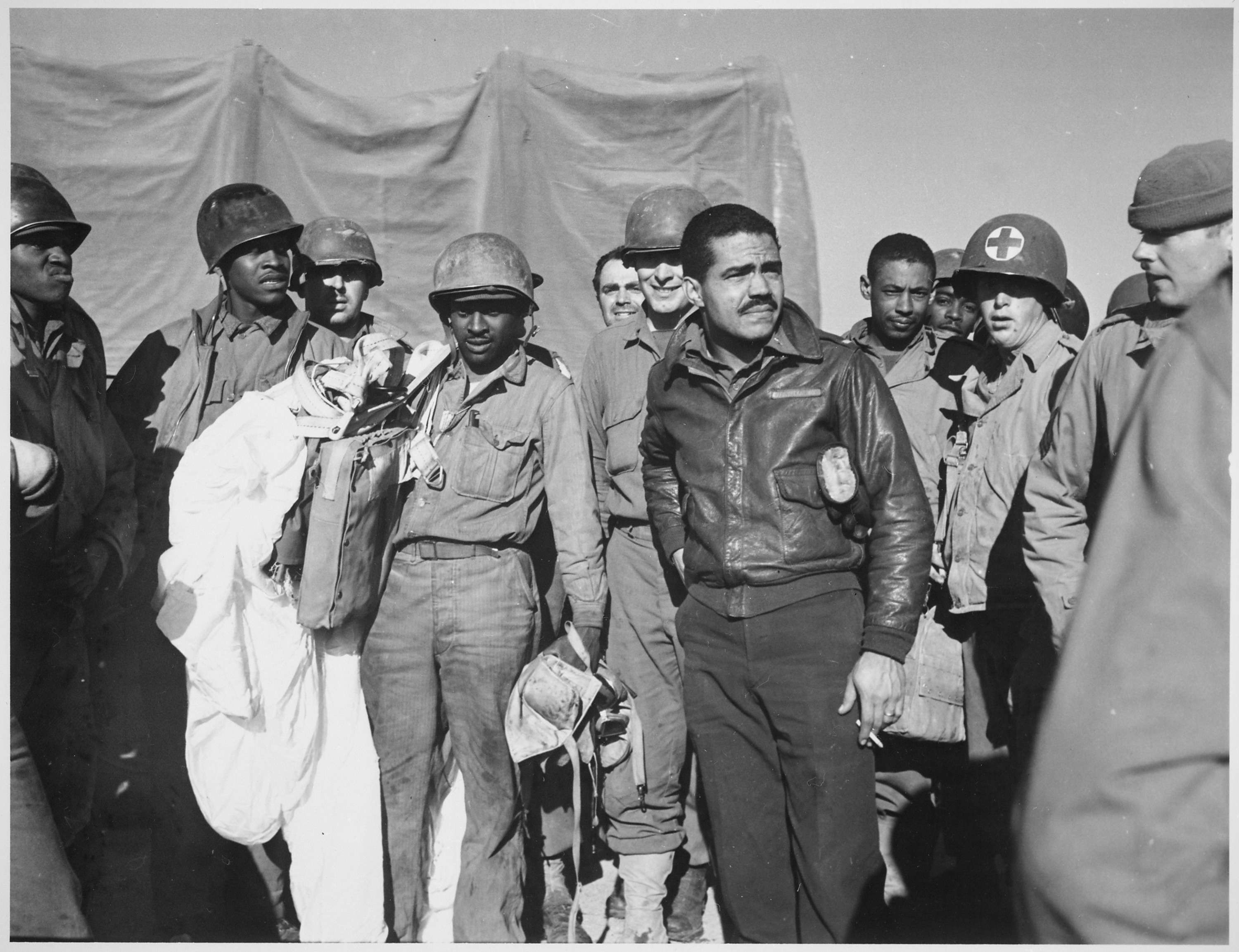Tuskegee Airmen at Anzio Beachhead
ca. 2/1944
Add to Favorites:
Add all page(s) of this document to activity:

At the start of World War II, African Americans serving in the Armed Forces were segregated into all-Black units. There were also limits on the positions they could hold — for instance, they were not allowed to fly planes in combat.
On April 3, 1939, Congress passed legislation expanding the Army Air Corps (the precursor to today’s Air Force). Among the act’s provisions was the creation of training programs located at historically Black colleges to prepare African American servicemen for Air Corps service.
On January 16, 1941, the War Department announced they were creating the 99th Pursuit Squadron. (Fighter planes were then called "pursuit planes," hence the name Pursuit Squadron; during the war the term was replaced with "fighter squadron.")
What made the 99th Pursuit Squadron different was that it was to be an all-Black flying unit trained at the Tuskegee Institute in Tuskegee, Alabama. War Department officials selected Tuskegee because it had an airfield and civilian pilot training program.
"Tuskegee Airmen" became the nickname for the World War II Army Air Forces units that were made up predominantly of African American pilots and maintenance crews.
From 1941 to 1946, nearly 1,000 African Americans completed training at the Tuskegee Institute as pilots, and many went on to serve with distinction during the war. Despite their service to the country, the U.S. military remained segregated until President Harry S. Truman issued Executive Order 9981 in 1948.
On March 29, 2007, the Tuskegee Airmen received the Congressional Gold Medal. During the ceremony, President George W. Bush acknowledged the men for their contribution to winning the war and saluted them for their service to the nation.
The original caption for this photograph reads: "Members of the 99th Fighter Squadron of the Army Air Forces, famous all-Negro outfit, who are rapidly making themselves feared by enemy pilots, pose for a picture at the Anzio beachhead. In the foreground, head bared, is 1st Lt. Andrew Lane."
The original caption uses the term "negro" to refer to Black people, which was commonly accepted in that era, but is outdated and inappropriate today.
On April 3, 1939, Congress passed legislation expanding the Army Air Corps (the precursor to today’s Air Force). Among the act’s provisions was the creation of training programs located at historically Black colleges to prepare African American servicemen for Air Corps service.
On January 16, 1941, the War Department announced they were creating the 99th Pursuit Squadron. (Fighter planes were then called "pursuit planes," hence the name Pursuit Squadron; during the war the term was replaced with "fighter squadron.")
What made the 99th Pursuit Squadron different was that it was to be an all-Black flying unit trained at the Tuskegee Institute in Tuskegee, Alabama. War Department officials selected Tuskegee because it had an airfield and civilian pilot training program.
"Tuskegee Airmen" became the nickname for the World War II Army Air Forces units that were made up predominantly of African American pilots and maintenance crews.
From 1941 to 1946, nearly 1,000 African Americans completed training at the Tuskegee Institute as pilots, and many went on to serve with distinction during the war. Despite their service to the country, the U.S. military remained segregated until President Harry S. Truman issued Executive Order 9981 in 1948.
On March 29, 2007, the Tuskegee Airmen received the Congressional Gold Medal. During the ceremony, President George W. Bush acknowledged the men for their contribution to winning the war and saluted them for their service to the nation.
The original caption for this photograph reads: "Members of the 99th Fighter Squadron of the Army Air Forces, famous all-Negro outfit, who are rapidly making themselves feared by enemy pilots, pose for a picture at the Anzio beachhead. In the foreground, head bared, is 1st Lt. Andrew Lane."
The original caption uses the term "negro" to refer to Black people, which was commonly accepted in that era, but is outdated and inappropriate today.
This primary source comes from the General Records of the Department of the Navy.
National Archives Identifier: 520624
Full Citation: Photograph 80-G-54413; Members of the 99th Fighter Squadron of the Army Air Forces; ca. 2/1944; General Photographic Files, 1943 - 1968; General Records of the Department of the Navy, Record Group 80; National Archives at College Park, College Park, MD. [Online Version, https://docsteach.org/documents/document/tuskegee-airmen-anzio-beachhead, April 20, 2024]Rights: Public Domain, Free of Known Copyright Restrictions. Learn more on our privacy and legal page.



